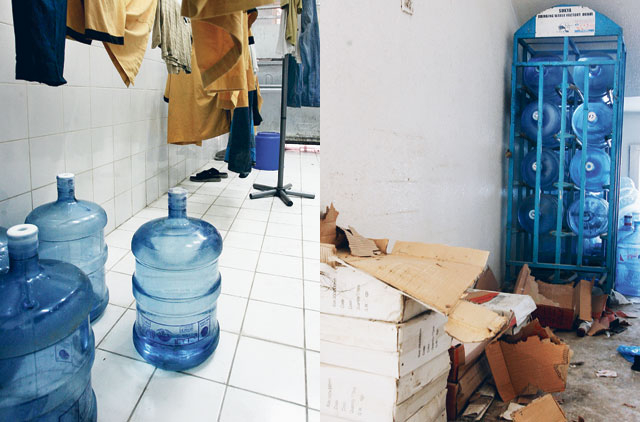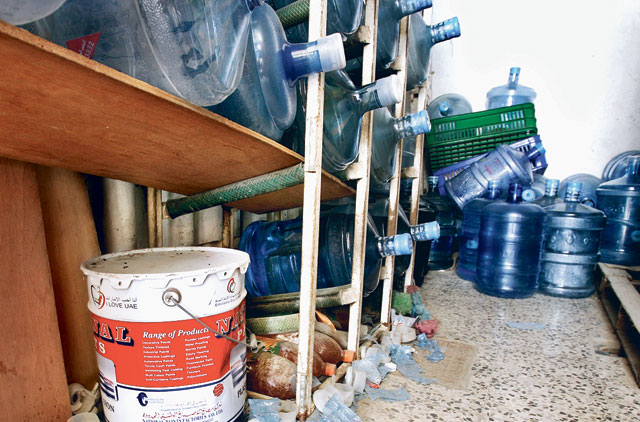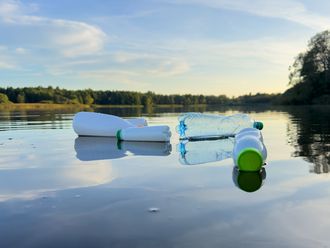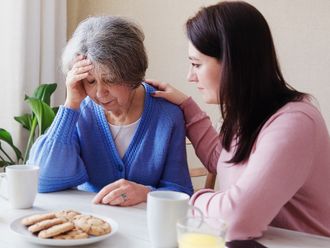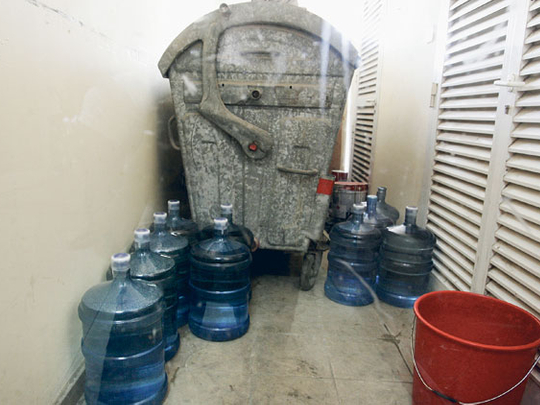
Dubai: Bottled drinking water supplied to homes in the UAE is being stored in extremely unhygienic conditions - in some cases even in garbage rooms - an XPRESS investigation has revealed.
Behind the widespread underhand practice is a dangerous nexus between certain bottled water companies and building watchmen, who are putting residents at risk of serious diseases.
The modus operandi is simple: In order to create a monopoly in residential buildings, companies sell five-gallon water bottles, which cost Dh7 on the shelf, to building watchmen for Dh5.
The watchmen sell these bottles to residents for Dh6 or Dh6.50.
But as opposed to companies, watchmen care little about storing the water bottles hygienically. As XPRESS found, they keep the bottles in unsanitary environments, rendering the water unfit for consumption.
Something rotten here
In the Awqaf building in Muhaisnah, Al Ghusais, we found several five-gallon water bottles concealed in a garbage room along with washing machine junk, an open can of paint, rotten food and an overflowing trash bin.
"The risk of contamination is high when water is stored over an extended period of time in unhygienic areas such as near trash bins. As garbage often attracts flies, and flies carry various diseases, fly-borne diseases such as hepatitis A, gastroenteritis and salmonellosis (typhoid fever) can then be transferred to you through the water dispensers," said Dr Omar Iqbal Rathore, specialist gastroenterologist, Welcare Hospital.
In Deira's Al Baraha area, the sights were equally disturbing. Entering building number 16 on Street 3, often referred to as Atlas building, we were greeting by signs stating: "Don't put garbage bags inside the building."
What the maintenance team perhaps forgot to add were instructions about not storing water next to those garbage bags. By the elevator door lay the garbage room where multiple five-gallon water bottles were stacked side by side and on top of each other. Everywhere we looked bottles were sandwiched between trash cans. In the corner of the room lay a bucket of dirty brown water and a plastic jar with solvent.
Down the road on Street 6 was further proof of the underhand deals.
"Bottles that are stored in the garbage rooms of buildings are vulnerable to all sorts of contamination. It's extremely dangerous to drink from them," said a gastroenterologist working at a private clinic in Dubai.
In building 42, we came across an open air pocket. Inside the open-air atrium, we saw dozens of water bottles exposed to the sun's harmful rays. Alongside were used brooms, dustpans, paint cans and even an opened bottle of Clorox.
Out in the sun for weeks
A nearby watchman said that some of those bottles had been lying in the sun for weeks.
According to a study conducted in the UAE by microbiologists Nsaze and Babaride, the possibility of the growth of microorganisms increases when water bottles are stored under direct sunlight or in unhygienic conditions. "Water bottles should be stored away from soaps and detergents, paints and cleaning solutions, and especially, should never be stored in the sun," warns S.J., quality control manager at a UAE-based bottled water company, who requested that his identity be kept secret.
Obviously the warning is lost on players in the game as similar scenarios greeted us in Bur Dubai, Satwa and many areas of Sharjah.
In the Greenway building on King Faisal Street in Sharjah lay dusty bottles in an even dustier environment. In Abu Shagara's Middle East building we found bottles stored in the trash room.
"Water contamination could be physical (presence of foreign particles such as dirt); chemical (residue from sanitisers and detergents)' or microbiological (bacteria formed due to insufficient sterilisation, or exposure to certain elements," said S.J.
When it comes to storage, the laws are clear. "Water bottles need to be stored in a clean, dry, hygienic place, on a palette, and away from direct sunlight. To strictly abide by the rules would mean not leaving the bottles exposed to direct sunlight for even a minute," S.J. added.
Unfortunately, there is no standing law that prohibits the storage of water bottles by the watchmen of residential buildings or, in some cases, by ‘freelance salesmen'. A case is point is office boy Salim. The 40-year-old works as a part-time water delivery man in Bur Dubai after work. His arrangement with the water company is simple: For every bottle that he sells on their behalf he gets Dh1 in exchange. On an average day Salim earns up to Dh60. "I work from 6pm to 11pm supplying water bottles to residents," he said without elaborating where these bottles are stored.
"If stored outdoors at temperatures of 40 degrees and above, there is a strong possibility that polycarbonate material will leach out and give a plasticky taste to the water," said S.J.
A comment from Dubai Municipality was not available. There was no response from the four water companies we tried to contact in this regard either.
DANGERS OF WATER STORAGE NEAR...
Garbage areas: Garbage attracts flies. Flies carry germs which may lead to numerous sicknesses.
Open cans of paint: Paint has a toxic chemical known as DBY dibutyltin, which can leach into the water.
Brooms and mops: Brushes used to clean and sweep carry harmful pathogens which could lead to tetanus, typhoid fever, neumonia, syphilis, cholera, food-borne illnesses and tuberculosis.
DANGERS OF SUN EXPOSURE
- When exposed to direct sunlight, water can be contaminated in under an hour. "Due to the temperatures that exceed 40 degrees Celsius, bacteria may begin to grow," explains S. J. "By the time a bottle of water has been left exposed to the sun for 24 hours, toxic chemicals from the plastic may leach into the bottle."
- At temperatures such as those reached during summer in the UAE bacteria can grow at an alarming rate, especially, if for some reason, the reusable bottle wasn't sterilised to perfection initially
- Within a week of being left in the sun, the water may become dangerous for human consumption and can lead to the presence of coli-form bacteria (more commonly known as E. coli), which in turn causes urinary tract infection diarrhoea and meningitis.
-
After a month, the water becomes extremely dangerous to consume due to formation of decayed matter
DOS and DON'TS
DO a smell test. More than any other liquid, water absorbs smell the quickest. When bottles of drinking water are stored near trash bins and similar environments, they will take on the smell of their surroundings
DO ask the supplier to deliver direct to your door
DO wipe the bottle with a towel dipped in hot water before using it
DO rinse the bottle with tap water before inserting into the dispenser. Tap water contains chlorine, which sanitises the bottle. Although it isn't as effective as sterilisation, it does kill some of the bacteria
DO regularly sanitise your water dispenser by washing it with boiling water
DO store your water dispenser in your living area, in a cool, dry place, away from direct sunlight
DON'T buy water bottles from a middleman. Deal directly with the supplier or a well-reputed supermarket
DON'T purchase water from a shop that displays the bottles in the sun
DON'T put a water bottle on your dispenser before ensuring where it's been. A single bacterium on the bottle may contaminate your entire dispenser
DON'T store your water dispensers and bottles near toilets or cooking areas. Water absorbs smells faster than other liquids, and you don't want your drinking water to reek of sewage


